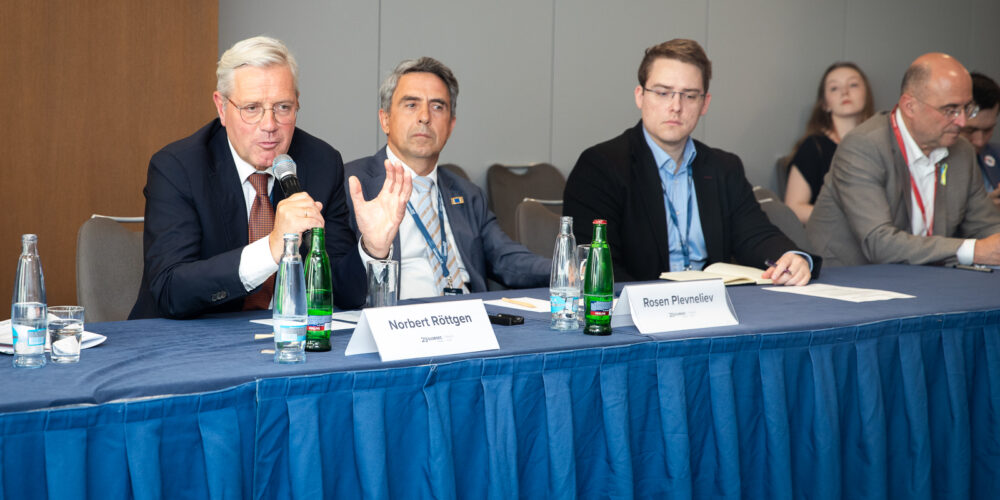On June 13, 2025, Atlantik-Brücke, together with the Wilfried Martens Centre for European Studies, hosted a side session at the GLOBSEC Forum in Prague. Under the title “Securing the Future of Europe in the New Global Order: Can Germany Lead Once Again?” our Deputy Chairman Dr. Norbert Röttgen and our CEO Julia Friedlander discussed with former Slovak Finance Minister Ivan Mikloš, former NATO Deputy Director Gerlinde Niehus, Vit Novotný from the Martens Centre, and former Bulgarian President Rosen Plevneliev. The discussion was moderated by Lucie Tungul from the Czech think tank TOPAZ.
By Jakob Flemming
It was no coincidence that this year’s GLOBSEC Forum in Prague took place under the motto: “Commanding (in) Chaos: Time for Europe to Step Up.” For months, one could hear in all European capitals that Europe’s time has come. It has long been clear that Europe must take on more responsibility in order to safeguard security and prosperity. Yet the questions remain: Is Europe capable of making the “step up”? And how much unity on the one hand, and leadership on the other, will be required?
These and other questions, as well as Germany’s contribution to a capable Europe, were at the heart of the side session. The contributions of experts from four EU member states and the United States led to three key insights:
1. Europa is not united
The demand that Europe must “speak with one voice” in foreign and security policy, but also in (external) economic policy, is neither new nor particularly controversial in the political mainstream. Former Chancellor Angela Merkel was already using this phrase in 2019. Six years later, the formulation is probably even more common and is employed across the political spectrum, from EPP Chairman Manfred Weber to the Greens. Behind it lies the conviction that only a Europe acting in unity can wield geopolitical weight.
More articles about this topic:
Yet the reality is often quite different: Europe does not speak with one voice on many issues. Slovakia blocked new sanctions against Russia for weeks; on the question of security guarantees for Ukraine, not only Hungary and Slovakia break ranks; Spain refuses to commit to NATO’s 5% goal; Germany and Poland are at odds over border controls; and in Middle East policy, Europe is split into at least two camps. Across nearly all policy areas, one thing is clear: genuine unity looks different.
2. Europe does not unite through mere invocations.
Following this assessment, the question arises: how can Europe’s unity be achieved? One thing became clear during the side session: the constant repetition of incantations such as “Europe must now speak with one voice” or “Europe United” in response to “America First” will not bring about the desired outcome. The call to abolish the unanimity principle in favor of majority voting in the Common Security and Defense Policy may well be justified, but it is simply unrealistic.
Instead, participants voiced a desire for more leadership from the center of Europe, particularly from Germany. In the past, euphemisms such as “leading from the center” or “leading from behind” were often used. However, as one participant put it, what is truly needed is for Germany to lead plainly and directly from the front.
3. Informal alliances or “coalitions of the willing” are new options.

